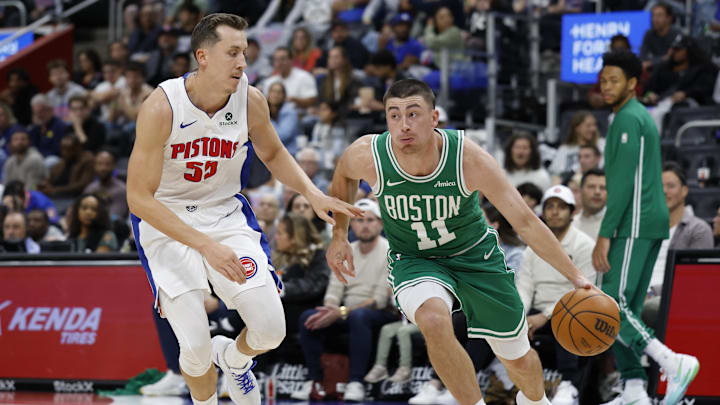After their disappointing start to the season, the Detroit Pistons righted the ship in the ensuing two games. In their home opener on Sunday, the Pistons took care of business against the Boston Celtics despite a slow start. After falling behind by double digits in the first quarter, the Pistons dominated defensively and on the boards to come back and win it relatively comfortably.
There were plenty of positives to take away from the game, including Jalen Duren's breakout game and Ausar Thompson's two-way impact, but one major disappointment continues to be Duncan Robinson. Detroit's major offseason addition, who was supposed to replace Malik Beasley and Tim Hardaway Jr., was once again the weakest link on the team.
Duncan Robinson Continues to Raise Questions with Poor Start to Season
Robinson was matched up with Payton Pritchard for most of the afternoon and was consistently lit up. The Pistons tried to switch him out from guarding Pritchard, Jaylen Brown, or Derrick White -- basically any Celtics player with any offensive juice -- but Boston, as an intelligent team, continued to hunt him. The fact that the veteran small forward wasn't able to hold his own against Boston's middling offensive creators certainly doesn't bode well for his viability against better competition.
Detroit obviously didn't expect much defensively from Robinson when they signed him. His defensive shortcomings are well-documented at this point. Yet, they wanted him to be a reliable three-point shooter who would space the floor for the Pistons' creators. The most disappointing part of Robinson's start to the season has been his ineffectiveness as a shooter. He finished with 2/7 from downtown on Sunday, bringing his season average to 30% on 6.6 threes per game.
As a result, Robinson was the only Piston who finished with a negative plus/minus. In his 30 minutes, the Pistons were outscored by six, and won the 18 minutes he was on the bench by 12.
For Robinson to be worth playing over 30 minutes per game like he did in each of the first three games, he needs to be a lot better as a shooter. To make up for the points he gives up on the defensive end, Robinson needs to shoot closer to 40% from downtown on a higher volume.
For comparison, Beasley made 41.6% of his threes on 9.3 attempts last season, despite playing only 27.8 minutes per game. Maybe it's not fair to expect him to replicate Beasley's production, but he needs to at least get to a respectable enough level to keep his starting spot.
